Lab Members
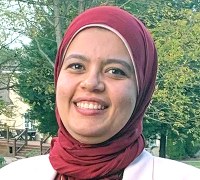 Riham Abouleisa, Ph.D., Pharm.D.
Riham Abouleisa, Ph.D., Pharm.D.
Riham Abouleisa, Ph.D., Pharm.D., is a postdoctoral research fellow at the Institute of Molecular Cardiology at the University of Louisville.
In 2004 she graduated from a school Pharmacy at the University of Zagazig, Egypt, and Dr. Abouleisa earned her Ph.D. in cardiovascular molecular biology from the University of Manchester, UK, in 2013.
Dr. Abouleisa was highly interested and passionate about pursuing a career in research, mainly to tackle heart failure. However, for family reasons, she moved to San Francisco in 2014, where she acquired extensive experience teaching undergraduate, graduate, and medical students at leading universities.
Nevertheless, she didn't forget about her ultimate goal of contributing to cutting-edge research that could alleviate heart failure's burden, and, in June 2018 joined Dr. Mohamed's laboratory at the University of Louisville.
Dr. Abouleisa's contribution to the research includes three main projects:
- Developing the culture system for pig/human heart slices to be functionally and structurally viable for six days.
- A novel approach to inducing endogenous cardiomyocyte proliferation to treat heart failure.
- Identifying the relationship between cardiomyocyte proliferation and cardiac metabolism
Outside the lab, she enjoys hiking and cooking, and her favorite motto is, "One person can make a difference."
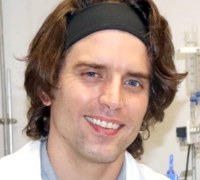 Marc Dwenger, Ph.D.
Marc Dwenger, Ph.D.
Marc Dwenger, Ph.D., is currently a Postdoctoral Fellow in Dr. Tamer Mohamed's lab.
Before joining Dr. Mohamed's lab, I established a strong foundation of research expertise in ion channel biology in the lab of Dr. Matthew Nysotoriak, mainly focusing on utilizing patch clamp electrophysiology to elucidate the relationship between vascular blood flow and cardiovascular metabolism.
Building upon this previous research, my current role in the lab involves investigating the relationship between ion channel development and cardiac electrophysiology.
Besides my work in the lab, I enjoy several activities: hiking, biking, playing basketball, and spending quality time with my wife and our cat.
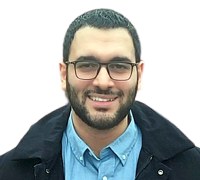 Ahmad Gebreil, M.D.
Ahmad Gebreil, M.D.
Ahmad Gebreil, M.D., is a multipotentialite who is always striving for progress.
I'm reliable, cheerful, and energetic! I believe that marrying my two passions being a clinician and a researcher makes me a more well-rounded person who is passionate about exploring medical mysteries and how I could better serve my patients and the world.
They say: "To live in service of others is not to die."
I promote love. And every time you'll try labeling me, I'll disappoint you! I exist in intersections.
 Dana Hammouri, MS
Dana Hammouri, MS
Dana Hammouri, MS, completed her bachelor's degree in pharmacy and master's degree in clinical pharmacy at Jordan University of Science and Technology.
I'm currently in my journey to achieve a Ph.D. degree in pharmacology and toxicology and I chose this field because I believe that pharmacology plays a vital role, existing at the intersection between development and application of pharmaceuticals.
My current research focus at Dr. Mohamed's lab is to identify potential regulators of the cardiac regeneration barrier.
I hope to be able to transform from a highly ambitious woman who is determined to work hard to someone who makes proud achievements in the field.
My long-term goal is to use rigorous research methodology to generate scientific knowledge to make a unique contribution to any area to which I’m exposed to and make a real and lasting improvement in today's science and tomorrows medicines.
Jessica Miller, BS
Jessica Miller, BS, is a Biomedical Engineer who has six years of hands-on experience with wet lab techniques, cell and tissue culture work, as well as the design, development, and implementation of bioengineered devices and techniques.
In my undergraduate studies, I volunteered as an undergraduate researcher in a biomedical engineering laboratory that focused on cardiac regeneration techniques and therapies that utilize induced pluripotent stem cell derived cardiomyocytes.
During this time, I conducted research that focused on techniques used in cardiac regeneration, cardiac fibrosis and remodeling, and assisted in the development of a bioengineered physiological flow loop system to mature iPSC-CMs in a fibrin gel by integration of mechanical preload/afterload induced by pulsatile pressure
In my graduate research, my dissertation work has focused on establishing thin cardiac tissue slices as a more reliable platform for detecting cardiotoxicities and investigating cardiovascular disease induced tumorigenesis.
Additionally, I assisted in the development of a cardiac tissue slice culture model that can emulate cardiac physiology and pathophysiology in vitro.
 Qinghui Ou, BS
Qinghui Ou, BS
Qinghui Ou, BS, earned her BS in Nursing from Hunan Medical University in China and worked as a nurse for 10 years in China.
I joined in the research laboratory in the Department of Cardiovascular Medicine at University of Louisville in 2004 and started my academic career in cardiac research.
Initially, I participated in research work focusing on gene therapy against myocardial ischemia/reperfusion injury in vivo in mice using recombinant adenovirus 5 (rAd5) and recombinant adeno-associated viral (rAAV) vectors mediated-gene transfer with inducible nitric oxide synthase (iNOS), cyclooxygenase-2 (COX-2), and hemooxygenase-1 (HO-1) genes. Then,
I was engaging in developing a non-invasive, cardiac-specific biomarker system to monitor the extent of cardiac damage in vivo in three different animal models of myocardial ischemia/reperfusion injury (pigs, rabbits, and mice). Subsequently, I was conducting research in the area of stem cell therapy for cardiac repair using adult stem cells.
Since 2018, I helped to set up a new laboratory as a lab manager. I started to work on developing and establishing the heart slice technology, a novel approach and method for heart failure translational research.
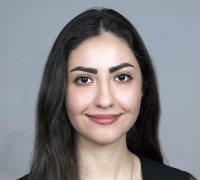 Ghazal Sadri, M.Sc.
Ghazal Sadri, M.Sc.
Ghazal Sadri, BS, received her bachelor's in chemistry from Shiraz University in Iran.
During her undergrad, she participated in research in the laboratory of Dr. Khalili in the organic chemistry department, where he focused on the optimal synthesis of bi-aryl ketones from aryl halides.
After moving to the U.S., she started the laboratory technician position in Dr. Moore's Lab at UofL's Diabetes and Obesity Center.
In the fall of 2021, Ghazal was admitted into the Ph.D. program in biochemistry and molecular genetics, and she contributed to several cardiology research projects in Dr. Moore's lab.
For her main project, she investigated the role of Collagen XIX in the cardiac extracellular matrix structure and myocardial function.
Ghazal joined Dr. Mohamed's lab in 2022 to start on her Ph.D. dissertation project on the role of sarcomeres in regulating cardiomyocyte proliferation.
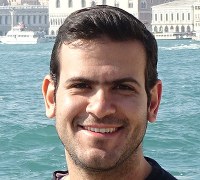 Abou Bakr Salama, M.D., Ph.D.
Abou Bakr Salama, M.D., Ph.D.
Abou Bakr Salama, Ph.D., has broad experience in both clinical and basic science tracks of cardiology, believing that the clinical scientist can bring innovative solutions to the clinical problems.
He finished his internal medicine residency subspecializing in cardiology, and interventional cardiology fellowship training by end of 2018. Working as a clinical and interventional cardiologist, he could understand the gaps in clinical practice that requires innovative scientific solutions.
Therefore, he decided to pursue the clinical scientist pathway to be able to provide answers to the unsolved clinical questions and seek innovative solutions to alleviate patients suffering and improve outcomes of cardiac diseases.
Hence, he started a worldwide journey to build up his research experience through acquiring his Master's degree in biotechnology from the America University in Cairo, then a Ph.D. degree in cardiovascular sciences from the University of Verona and is currently doing a post-doctoral research at the University of Louisville.
Dr. Salama's research is focused on cellular and molecular mechanisms of cardiomyocytes division as an approach for cardiac regeneration to mitigate the damage caused by myocardial infarction and alleviate heart failure. He is working on understanding the molecular drivers and modulators of cardiomyocytes decision to progress in cell cycle.